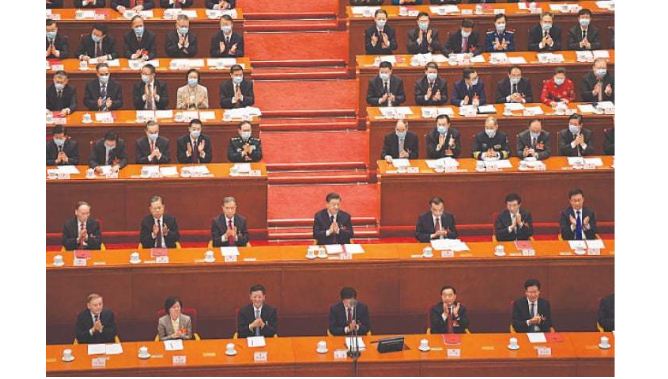BEIJING: China’s parliament voted Thursday for sweeping changes to Hong Kong’s electoral system, including powers to veto candidates, as Beijing moves to ensure that only “patriots” run the city following huge pro-democracy rallies.
Beijing has acted decisively to dismantle Hong Kong’s limited democratic pillars after massive and sometimes violent protests coursed through the financial hub in 2019.
At last year’s meeting of the National People’s Congress, the Communist Party leadership imposed a national security law on Hong Kong that has since been weaponised against the democracy movement.
Dozens of campaigners have been prosecuted or jailed, smothering protests in a city which had enjoyed greater political freedoms than the authoritarian mainland under the “one country, two systems” arrangement established when Britain handed the territory back to China in 1997.
On Thursday, only one member of the 2,896-strong National People’s Congress abstained in the vote, which critics say will hammer another nail in the coffin of Hong Kong’s democracy movement.
The decision aims to place responsibility for running the city in the hands of “patriots governing Hong Kong”, Chinese Premier Li Keqiang told reporters after the vote.
Senior Chinese officials have made clear that loyalty to the Communist Party will be key to deciding if a Hong Konger is a “patriot”.
Loyalists in
Chinese state media on Thursday sketched out some of the key provisions of the law, which will still need to be written and then promulgated under the country’s opaque political system.
Hong Kong’s influential Election Committee, which selects the city’s leader and is already stacked with Beijing loyalists, will be expanded to 1,500 representatives, up from 1,200.
A separate committee will also be set up to vet the political views of candidates while the number of seats in the LegCo — Hong Kong’s legislature — will rise from 70 to 90.
Currently, only 35 seats in the chamber are directly elected and it is not yet clear what the future proportion will be.
But analysts said the initial details showed that China plans to reduce the influence of directly elected officials in both the LegCo and the committee that chooses the chief executive.
“It’s a fail-safe formula to ensure only people deemed patriots will be on those two important bodies,” Willy Lam, professor at the Chinese University of Hong Kong’s Centre for China Studies, told AFP.
“From Beijing’s point of view, members of the pro-democracy coalition are not considered to be patriotic.” Victoria Tin-bor Hui, Associate Professor of Political Science at the University of Notre Dame, took a similar view, telling AFP: “The new electoral arrangements will make sure that there is no chance for any pro-democracy figure to run in elections and get elected at all.” UK Foreign Secretary Dominic Raab said the plan would “hollow out the space for democratic debate in Hong Kong, contrary to the promises made by China”.
“This can only further undermine confidence and trust in China living up to its international responsibilities.”

















